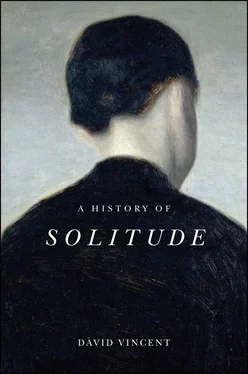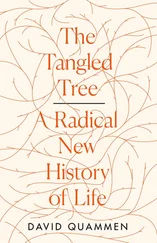Two successful marriages and increasing worldly fame underpinned his broader analysis. ‘Affectionate intercourse,’ he wrote at the beginning of Solitude Considered , ‘is an inexhaustible fund of delight and happiness. In the expression of our feelings, in the communication of our opinions, in the reciprocal interchange of ideas and sentiments, there lies a treasure of enjoyment, for which the solitary hermit, and even the surly misanthrope, continually sighs.’ 14Zimmermann shared with the intellectuals with whom he worked and corresponded across Europe the Enlightenment belief that human nature was essentially social, and that all other modes of living were either a deviation or a temporary respite from the pursuit of personal contentment and collective advancement. 15‘Solitude must render the heart callous,’ he observed in his collected Aphorisms . ‘What has it whilst alone to pity, or to cherish? It makes no provision but for itself; there its care begins, there it terminates. Humanity is unknown to the Solitaire. Without it, and all the dear cares that it includes, of what worth is existence?’ 16Diderot’s Encyclopédie debated the subject. Respect should be paid to the Carthusians, but their way of life belonged to much earlier centuries of church persecution. Times had changed. ‘In our tranquil era,’ the Encyclopédie argued, ‘a truly robust virtue is one that walks firmly through obstacles, and not one that flees them. … A solitary is, in regard to rest of mankind, like an inanimate being; his prayers and his contemplative life, which no one sees, have no influence on society which has more need of examples of virtue before its eyes than in the forests.’ 17
Duty and self-interest conspired to relegate solitude to the margins of useful living. Zimmermann’s contemporary Christian Garve, an influential propagandist of the German Enlightenment, summarized the approach: ‘Overall, and in the nature of things, society seems to be made for times of health, vivacity, and amusement; solitude, by contrast, seems to be the natural haven of the infirm, the grieved, and the stricken.’ 18There were classical precedents for this emphasis, but the more recent authorities with whom Zimmermann was debating had taken an alternative view. Petrarch was in flight from the corruption and distraction of urban commerce: ‘And so, to dismiss the matter once for all,’ he concluded, ‘in my opinion practically every busy man is unhappy.’ 19In the late sixteenth century, Montaigne, in his ‘Essay on Solitude’, set out an essentially secular argument for withdrawal from the press of business. He presented a set of prescriptions for solitary self-sufficiency: ‘Now since we are undertaking to live, without companions, by ourselves, let us make our happiness depend on ourselves; let us loose ourselves from the bonds which tie us to others; let us gain power over ourselves to live really and truly alone – and of doing so in contentment.’ 20His notion of retirement was not an intermission from public life but a permanent cessation.
By the later seventeenth century, the increasing prosperity and influence of the commercial classes were reflected in a new emphasis in the long-standing debate over the competing virtues of contemplation and action. John Evelyn, who in his private life found time for meditative retreat, adopted the case for sociable endeavour in both business and religion in response to a provocative essay by the Scottish lawyer George Mackenzie. 21In Publick Employment and an Active Life Prefer’d to Solitude , he argued against extreme forms of spiritual and secular withdrawal. ‘Certainly,’ he wrote, ‘those who either know the value of themselves, or their imployments, may find useful entertainments , without retiring into Wildernesses, immuring themselves, renouncing the World, and deserting publick affairs .’ 22The free exchange of ideas was the driver of both personal and collective wealth. ‘For, believe it Sir,’ he insisted, ‘the Wisest men are not made in Chambers and Closets crowded with shelves ; but by habitudes and active Conversations .’ 23Periods of reflection were adjuncts to public life, not substitutes for it. The structures of commerce and politics were still vulnerable to the seductive appeal of escape from the demands and disciplines of collective discourse. ‘The result of all is,’ Evelyn’s essay concluded, ‘ Solitude produces ignorance , renders us barbarous , feeds revenge , disposes to envy , creates Witches , dispeoples the World , renders it a desart , and would soon dissolve it.’ 24
Amongst his contemporaries, Zimmermann was unusual in seeking to explore the range of circumstances that might cause an individual to retreat from the domestic and public structures of eighteenth-century life. His wide reading in several European languages and his professional engagement with illness and personal breakdown caused him to take seriously the possibilities of withdrawal. At its most benign, solitude was ‘a tendency to self-collection and freedom’. 25There was a tradition of seeking a retreat in order to think or engage in creative work. ‘I may not deny,’ admitted Robert Burton in his Anatomy of Melancholy of 1621, ‘but that there is some profitable Meditation, Contemplation, and kinde of Solitarinesse to be embraced, which the Fathers so highly commend. … [which] Petrarch, Erasmus, Stella , and other so much magnify in their bookes.’ 26During the eighteenth century, the attraction of such an avoidance of company was becoming more apparent. It was partly that the sheer noise and intensity of living in the bustling urban centres made ever more attractive the search for the peace and quiet in which thoughts might be collected. Some kind of time alone was required to write, or to plan new ventures. A place always had to be found, argued Zimmermann, for ‘an enterprising and ardent mind’ to retire ‘from the uninteresting distractions of company, to digest and mature in solitude’, that he might better formulate his ‘adventurous and capacious projects’. 27It was not a rejection of intercourse, but rather an escape from its more trivial and distracting aspects in order that more profound or ambitious interventions might be made in the intellectual or commercial life of the community.
Towards the end of the century, the implications of ‘self-collection’ were taking on a more focussed meaning, particularly in the writings of Jean-Jacques Rousseau, whose Confessions and Reveries of the Solitary Walker were posthumously published in 1782, just as Zimmermann was preparing to write his treatise. As The Gentleman’s Review irreverently put it, ‘Philosophers have just found out that the best way to bring a man to an acquaintance with himself, or, in short, to his senses, is to sequester himself into solitude .’ 28The search for a narrative identity, discoverable only through solitary self-analysis, opened a path towards a new genre of literary autobiography. 29Rousseau explained the project of the Solitary Walker : ‘It is in this state of mind that I resume the painstaking and sincere self-examination that I formerly called my Confessions . I am devoting my last days to studying myself and to preparing the account of myself which I shall soon have to render.’ 30Zimmermann was ambivalent about Rousseau’s rejection of company in his search for self-knowledge. He was sympathetic to the personal sufferings that had forced the philosopher into retirement. His critics, he argued, were ‘allowing nothing for the attack of human injustice and cruelty; nothing for the torments of penury; nothing for the ravages of sickness; the bloom and vigour of his genius is forgotten’. 31But he had little confidence that the true self was only discoverable in the absence of society, and was convinced that the project to which Rousseau was committed in the closing years of his life could only lead to personal ruin: ‘Every physician, however, who studies the history of Rousseau, will plainly perceive that the seeds of dejection, sadness and hypochondriacism, were sown in his frame of mind and temper.’ 32
Читать дальше












